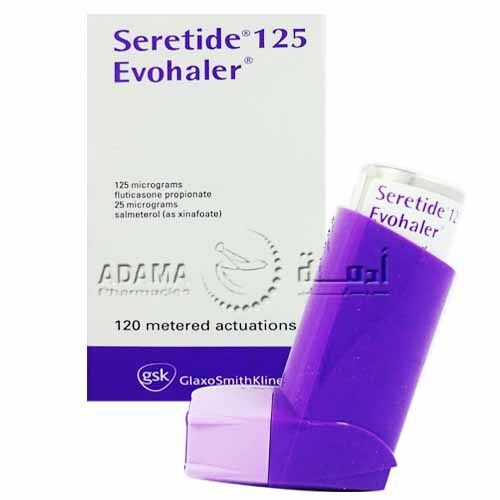Description
Seretide 125 Evohaler
Composition:
25 microgram/125 microgram/dose pressurised inhalation, suspension
salmeterol/fluticasone propionate.
Prescribed for:
Help prevent breathing problems such as asthma.
You must use Seretide every day as directed by your doctor. This will make sure that it works properly in controlling your asthma.
Seretide helps to stop breathlessness and wheeziness coming on. It does not work once you are breathless or wheezy. If that happens you need to use a fast acting ‘reliever’ medication, such as salbutamol.
Precautions:
You are allergic (hypersensitive) to salmeterol, fluticasone propionate or to the other Ingredient
Your doctor will supervise your treatment more closely if you have medical conditions such as:
- heart disease, including an irregular or fast heartbeat
- overactive thyroid gland
- high blood pressure
- diabetes mellitus (Seretide may increase your blood sugar)
- low potassium in your blood
- Tuberculosis (TB) now, or in the past.
Dosage:
Adults and adolescents aged 12 years and over
- Seretide Evohaler 25/50 - 2 puffs twice a day
- Seretide Evohaler 25/125 - 2 puffs twice a day
- Seretide Evohaler 25/250 - 2 puffs twice a day
Children 4 to 12 years of age
- Seretide Evohaler 25/50 - 2 puffs twice a day
- Seretide is not recommended for use in children below 4 years of age.
Possible side effects:
Very Common (affects more than 1 person in 10)
- Headache - this usually gets better as treatment continues.
- Increased number of colds have been reported in patients with COPD.
Common (affects less than 1 person in 10)
- Thrush (sore, creamy-yellow, raised patches) in the mouth and throat. Also sore tongue, throat and hoarse voice. Rinsing your mouth out with water and spitting it out immediately after taking each puff may help. Your doctor may prescribe an antifungal medication to treat the thrush.
- Feeling shaky and fast or uneven heartbeat (palpitations) - these are usually harmless and get less as treatment continues.
- Muscle cramps.
The following side effects have also been reported in patients with Chronic Obstructive Pulmonary Disease (COPD):
- Pneumonia and bronchitis (lung infection). Tell your doctor if you notice any of the following symptoms: increase in sputum production, change in sputum colour, fever, chills, increased cough, increased breathing problems.
- Bruising and fractures.
- Inflammation of sinuses (a feeling of tension or fullness in the nose, cheeks and behind the eyes, sometimes with a throbbing ache).
- A reduction in the amount of potassium in the blood (you may get an uneven heartbeat, muscle weakness, cramp).
Uncommon (affects less than 1 person in 100)
- Rash.
- Very fast heartbeat (tachycardia).


